10+ Sample Franchise Proposals
-

Restaurant Franchise Proposal Template
download now -
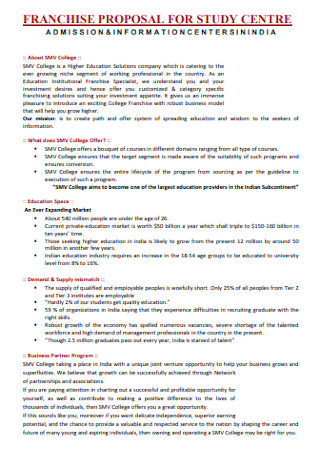
Franchise Proposal for Study Center
download now -
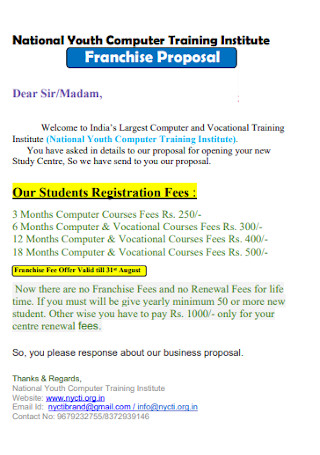
Computer email Institute Franchise Proposal
download now -
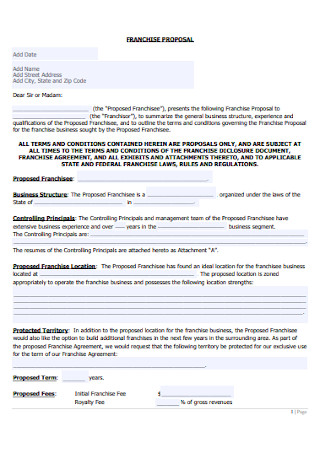
Sample Restaurant Franchise Proposal
download now -
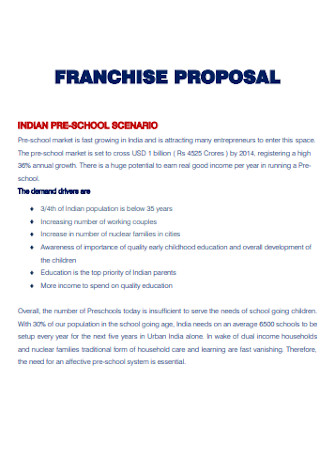
School Franchise Agreement Proposal
download now -
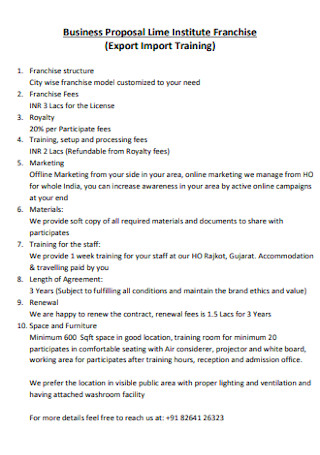
Franchise Intent Business Proposal
download now -
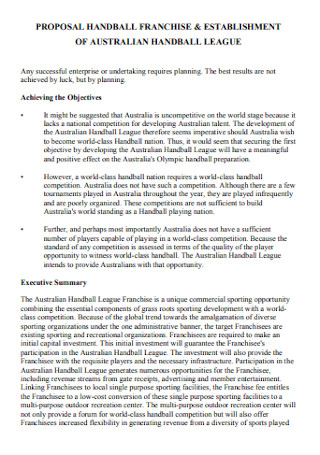
Franchising Proposal
download now -
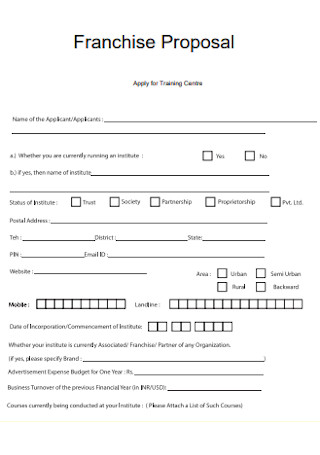
Foundation Franchise Educational Institute Proposal
download now -
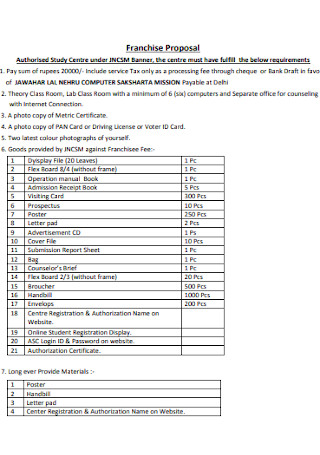
Franchise Partnership Proposal Format
download now -
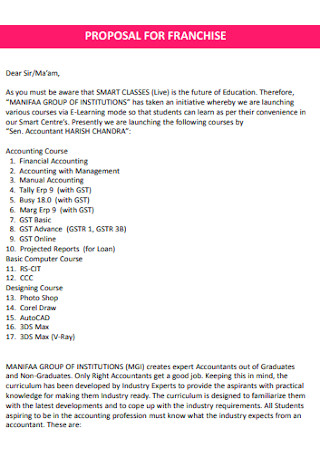
Basic Proposal for Preschool Franchise
download now -
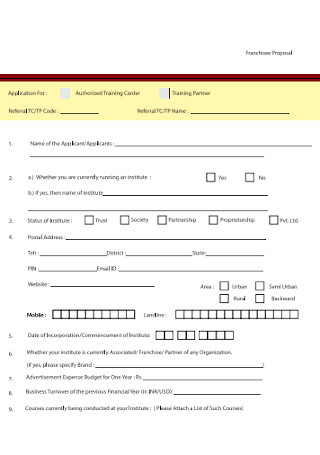
Formal Fast Food Franchise Proposal
download now
What Is a Franchise Proposal?
A franchise proposal is a written proposal that is part of the application process of a business franchise. Aspiring or potential franchisees would first need to have a comprehensive and compelling proposal approved before they can begin operating a franchise.
According to an online article by LinkedIn, there are four types of franchise opportunities aspiring entrepreneurs can apply for. These are product or distribution franchise; business format franchise; management franchise; and manufacturing franchise. Distribution franchise is essentially a situation where the franchisor authorizes and supplies the franchisee with the products or services to sell. A business format franchise grants the franchisee the licenses, trademark, and such from the franchisor. Management franchise is typically service-oriented and operates in a business to business format. Lastly, manufacturing franchise is basically the franchisor giving the franchisee permission and rights to production under the former’s trade name.
Benefits of a Franchise Business
A lot of lucrative businesses are franchises. From educational institutes to fast food chains, there is potentially a lot to gain from a franchise investment. The following examples below are just some well-known benefits of operating a franchise business:
How to Create a Franchise Proposal
A good franchise proposal needs to be both comprehensive and compelling. Crafting one can be a rather tedious and time-consuming process. The more convenient option would be to build on an existing template and modify it to one’s needs. In addition to the template, you can use the step-by-step instructions below to guide you:
Step 1: Executive Summary
Similar to a research proposal, it is best to start with an executive summary that offers an overview of your franchise proposal. Make sure to incorporate only the key points and major details of your proposal. An executive summary should be brief and should give just enough general background of the franchise proposition.
Step 2: Experience and Company Background
This section should answer the question regarding the capacity of the franchisee to replicate and operate the business. It should explain and address the qualifications of the franchisee. In a way, it can be likened to a sales pitch for a job. It is about marketing yourself as to why the parent company should hand over rights to you to propagate their business. It helps to give a rundown of your business acumen and relevant experience, much like you would enumerate achievements in your resume.
Step 3: Market Analysis and Plan
A market analysis is a crucial part of your franchise proposal. It should address the question on how feasible and realistic the business will be, given all the factors. A detailed and comprehensive market analysis looks into everything from customer profiles, geographical strategy, action plans, marketing techniques, opportunities, success rate, market trends, competition, and even external threats. It tries to answer the question of whether or not a franchise would be a success given all aforementioned circumstances.
Step 4: Management Structure
A business will not be able to run without the right people behind it. Your franchise proposal should be able to introduce the team members or the proposed organizational structure. A good team is needed to reassure franchisors that the business can be handled and managed properly. You need to make the argument of how capable your team is and how each role can contribute to the success of the franchise business.
Step 5: Financial Projection
Lastly, every business proposal needs a section dedicated to explaining the financial side of things. You need to be able to come up with relevant figures and projections on the costs, revenue, profit, as well as potential losses. Your franchise proposal should be able to offer a financial forecast that is sound, grounded in realistic circumstances, and backed by supporting facts.
FAQs
How do you write a franchise proposal?
To write a franchise proposal, you need to gather a significant amount of data and information. In other words, make sure to do your research. Some of the key elements in your proposal ought to include extensive market research and analysis, a sound marketing plan, financial projections, an overview of the company and its management structure, and other relevant information that could help your case.
What are the 4 types of franchising?
According to consultant firm Franchise Wizards, the four types of franchise business arrangements are: single unit, multi-unit, area developer, and master franchise.
How do you request a franchise?
The standard protocol in most scenarios is that a potential franchisee submits a franchise application to the parent company. The former may be asked to prepare a formal proposal or in other cases, the franchisor may request a letter of intent.
Operating a franchise can be the ultimate business smart goal for some people. There are people who just don’t want to go through the tedious process of creating a business model or crafting a business plan. If you want to run your own business with the added benefits that come with a franchise, then creating a winning proposal is a step in the right direction. Browse the sample templates above to customize your own franchise proposal today!
